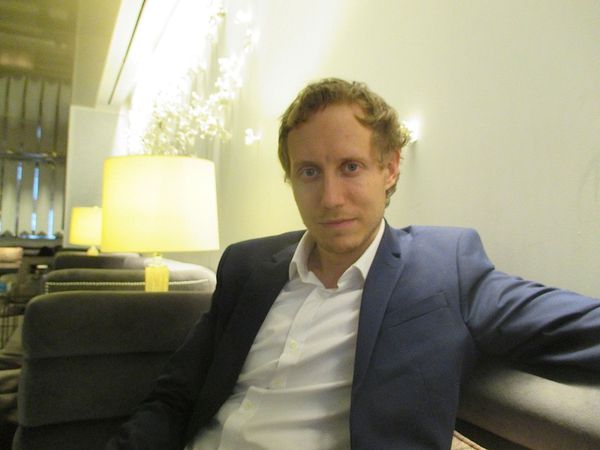 |
| Son Of Saul director László Nemes: "We wanted to convey something that goes against the perception through films, that it is a mixture of organisation and chaos." Photo: Anne-Katrin Titze |
Son Of Saul (Saul Fia), this year's Grand Prix du Jury winner at the Cannes Film Festival, will première in New York tonight at Lincoln Plaza Cinemas, featuring a post screening discussion with Géza Röhrig (Saul), moderated by Anne-Katrin Titze, following the 6:00pm show.
When László Nemes was in New York, he discussed with me his work with cinematographer Mátyás Erdély and the garments by Edit Szücs, the stature of Claude Lanzmann, looking at the natural elements in Auschwitz, Barry Lyndon, The Shining, Stanley Kubrick's abandoned Holocaust film, Kristina Söderbaum and what's up next for the Son Of Saul director.
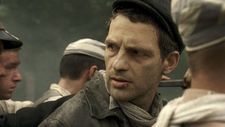 |
| Géza Röhrig as Saul Ausländer: "These are marked people." |
Anne-Katrin Titze: Fairly late in the film, you see people lined up and there is dandelion fluff floating in the air. Was that coincidence?
László Nemes: Absolutely. We were supposed to shoot it as an autumn film and we couldn't. So I had to endure the presence of spring elements in the film. But that looks good. I didn't do it on purpose, on the contrary.
AKT: It functions as a reminder that the world is going on.
LN: That's interesting. Yeah, that's like the end, you know, trees will grow.
AKT: I am glad you kept it. Your cinematographer [Mátyás Erdély] is fantastic.
LN: He is a very good friend. We made three short films together and talked a lot about cinema and films on a daily basis. We share. He is much more than just someone who operates the camera. He is really a thinker and tries to push the boundaries of filmmaking as well. So we're in it together.
AKT: Tell me about the costumes! It feels off, even calling them that. Saul has this enormous brownish red cross, bloody cross, that he is carrying. Did you experiment with this?
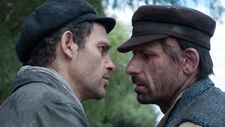 |
| Saul with Apikoyres (Márton Ágh) |
LN: That's a historical fact.
AKT: Yes, but you have others with smaller markings on their back.
LN: Yeah, sometimes they have no marking. It's systematic but it's not systematic. It's random, also. We wanted to convey something that goes against the perception through films, that it is a mixture of organisation and chaos. The X on the back is part of that. These are marked people.
AKT: And Saul gets the boldest one - the one that we are tied to. Again, the matter of identification. We can't help it.
LN: How many times did you see the film?
AKT: Once. At the New York Film Festival press screening.
LN: It seems that you had seen it several times.
AKT: I took notes. You begin the film with blurriness and bird song - another link to the dandelion.
LN: I always looked at the natural elements in the pictures on Auschwitz.
AKT: That ties you in with Lanzmann.
LN: Very much so. Shoah is very present.
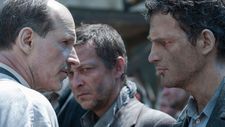 |
| Doctor Miklós (Sándor Zsótér) with Saul |
AKT: And in The Last Of The Unjust, with him in the present standing on the platform at the train station.
LN: Because that's what remains. When the signs of the extermination are not there, nature just recovers everything. And it's still there - what do we do with that? What happens when the signs and the stories are gone? Do we cease to remember?
AKT: In your film, the burial of the son becomes the link to humanity. The fact that if we don't have that symbolic act, we are lost.
LN: Absolutely. But for him it's very visceral and physical and concrete. It's not an intellectual's point of view, it's something anchored in reality. It's very physical and I wanted it in the film.
AKT: There are possibilities to read the son as his son or not his son.
LN: That's the journey of the viewer in a way. That's to determine also whether if it's important or doesn't make sense if it's the son or not the son. It doesn't matter after a while.
AKT: You give the option of two readings by bringing up the wife. You could have just left that out.
LN: I think you cannot reduce life to a binary situation. You have the zones in-between.
AKT: The scenes right before the people are sent into the fake showers - you twice emphasise the lies told to them in an attempt to keep them calm. "There will be soup," they are told. These moments are so chilling because it is clear how much people want to believe lies and how much this was used against them as part of this system.
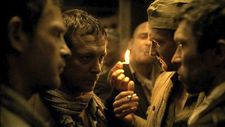 |
| László Nemes on Son Of Saul cinematographer Mátyás Erdély: "He is really a thinker and tries to push the boundaries of filmmaking as well." |
LN: I think, the Nazis, besides being murderers and thieves, were also liars. The entire process was invented using lies. And people want, in order to survive, to believe. That is something that we more and more forget because we have this external standpoint. When you're inside, it's a different story.
AKT: That fits for many situations where people want to believe lies because they feel powerless. The story of Son Of Saul is also personal for you?
LN: It's a personal mission. I wanted to make this film, yes, because I had a family that was wiped out with no trace. So, I guess, it was a way to leave a trace.
AKT: Making this film must have been extremely grueling for you. What's coming next?
LN: We have a story in mind of a film to be shot in Hungary. It's the story of a young woman in the 1910s before the First World War.
AKT: Is it a comedy? A musical?
LN: No, no. I'd like to do a musical! But not this one, it's a drama thriller.
AKT: Are there filmmakers you would say impacted you more than others for this project?
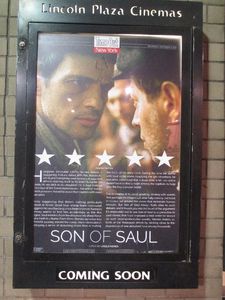 |
| Son Of Saul at Lincoln Plaza Cinemas |
LN: In general, Kubrick is the one that I'm the most interested in.
AKT: Any films in particular?
LN: His approach. You can feel his approach and the symptom as a reference point. I really like Barry Lyndon or The Shining. The thoughtfulness and the directing strategy.
AKT: Kubrick was planning to do …
LN [cutting me off, knowing where I was heading with the question]: … but he abandoned it. He didn't find the angle for his Holocaust film, The Aryan Papers.
AKT: Did you look into his preparation for The Aryan Papers? With Kristina Söderbaum?
LN: Yes, I did. I think he understood in a very visceral way that if you don't have the angle, you will end up with a postcard movie. And that's why I think he didn't want to do that.
Son Of Saul screened earlier this year at the London Film Festival and the UK release is scheduled for April 1, 2016.
Read what László Nemes had to say about Claude Lanzmann's The Patagonian Hare, Shoah and The Last Of The Unjust, the importance for him of the chaos of language and the precise sound design by Tamás Zányi.





















